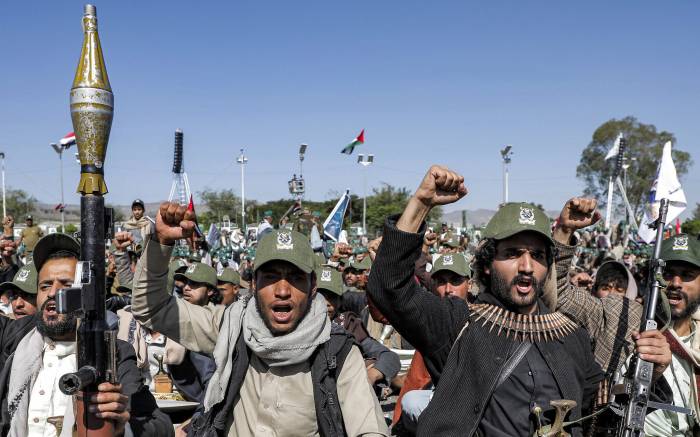Israel’s tense relationship with the Houthis, a Shiite militant group based in Yemen, underscores the complexity of the Middle East’s geopolitical landscape. The Houthis, formally known as Ansar Allah, have emerged as one of the region’s most aggressive anti-Israel forces, heavily backed by Iran. Their growing capabilities present a unique challenge to Israeli security, adding yet another dimension to the already volatile dynamics of the region.
The Houthis’ animosity towards Israel is deeply rooted in their ideological alignment with Iran, which has long been a vocal opponent of Israel’s existence. Over the years, Tehran has equipped the Houthis with advanced weaponry, including drones and ballistic missiles, enabling them to expand their operational reach. The group’s military evolution has been instrumental in transforming Yemen into a potential launchpad for strikes against Israel.
The Houthis’ activities are part of Iran’s broader strategy of proxy warfare , which aims to exert influence across the Middle East while avoiding direct confrontation. This approach has previously been evident in Tehran’s support for Hezbollah in Lebanon and Hamas in Gaza. By fostering alliances with such groups, Iran has strategically surrounded Israel with adversaries, complicating the Jewish state’s security calculus.
The recent missile attack targeting Israeli territory exemplifies the Houthis’ enhanced military capabilities. While the attack caused minimal physical damage, its implications are far-reaching.
The Houthis demonstrated their ability to target Israel from a significant distance, signaling a potential escalation in hostilities. Such actions have forced Israeli leadership to reassess its security strategy and prepare for a new front in an already complex regional conflict.
In response, Israel has initiated targeted strikes on Yemen’s infrastructure, including power plants and communication networks. These efforts aim to disrupt the Houthis’ operational capabilities and deter further aggression. However, the Houthis’ persistence in targeting Israel suggests a prolonged conflict that could further destabilize the region.
Israel’s response to the Houthi threat appears to follow a multi-pronged approach. First, the destruction of critical infrastructure in Yemen serves as an immediate tactic to weaken the Houthis’ ability to wage war. Strategic strikes on power plants, for example, limit their capacity to launch missiles and operate advanced weaponry.
Second, Israel is leveraging Yemen’s internal fragmentation to isolate the Houthis. The country is currently divided among several warring factions, each vying for control. By fostering alliances with non-Houthi groups, Israel aims to turn local populations against the Houthis, reducing their support base and further complicating their operations.
A third key component involves targeting the Houthi leadership. Israel’s history of eliminating key figures in adversarial organizations, such as Hamas and Hezbollah, highlights the effectiveness of this strategy. By neutralizing the movement’s leadership, Israel seeks to disrupt its organizational structure and diminish its operational capacity.
At the core of the Houthi threat lies the undeniable influence of Iran. Many experts believe that the Houthis would be incapable of sustaining their military campaigns without Tehran’s logistical and financial support. Iran’s provision of ballistic missiles, drones, and military training underscores its pivotal role in the Houthis’ operations.
For Israel, this places Iran directly in its crosshairs. Israeli leadership has repeatedly emphasized that countering Iran’s influence is essential to ensuring national security. However, addressing the Iranian dimension of the conflict is complicated by international dynamics, particularly the policies of the United States.
Under the Biden administration, U.S. policies towards Iran have faced criticism from Israeli commentators. The decision to unfreeze Iranian assets and re-enter negotiations regarding the nuclear deal has raised concerns in Israel about Tehran’s emboldenment. Critics argue that these policies limit Israel’s ability to take decisive action against Iranian proxies, including the Houthis.
Conversely, some analysts speculate that a more hawkish administration, such as a potential return of Donald Trump to the White House, could shift the balance. Trump’s administration was characterized by a tougher stance on Iran, including the implementation of severe sanctions and support for Israeli military operations. A change in U.S. leadership could therefore significantly influence Israel’s strategy in dealing with the Houthis and Iran.
The conflict between Israel and the Houthis is not an isolated issue but a microcosm of broader regional rivalries. The escalation of hostilities in Yemen threatens to destabilize neighboring countries, complicating international efforts to resolve the region’s conflicts. It also underscores the interconnectedness of Middle Eastern geopolitics, where actions in one country often have ripple effects across the region.
For Yemen, the continued militarization of the Houthis exacerbates an already dire humanitarian crisis. The country remains divided among multiple factions, with millions of civilians caught in the crossfire. Israel’s targeted strikes on Houthi-controlled areas risk further alienating local populations, potentially complicating its efforts to build alliances with non-Houthi groups.
As tensions escalate, Israel appears determined to neutralize the Houthi threat. Its strategy of infrastructure destruction, alliance-building, and leadership targeting underscores a commitment to safeguarding national security. However, the path forward is fraught with challenges, not least the question of how to address Iran’s central role in the conflict.
The evolving dynamics between Israel, the Houthis, and Iran will undoubtedly shape the Middle East’s geopolitical landscape in the coming years. For now, the region remains on edge, with the prospect of further escalation looming large.
(If you possess specialized knowledge and wish to contribute, please reach out to us at opinions@news.az).
